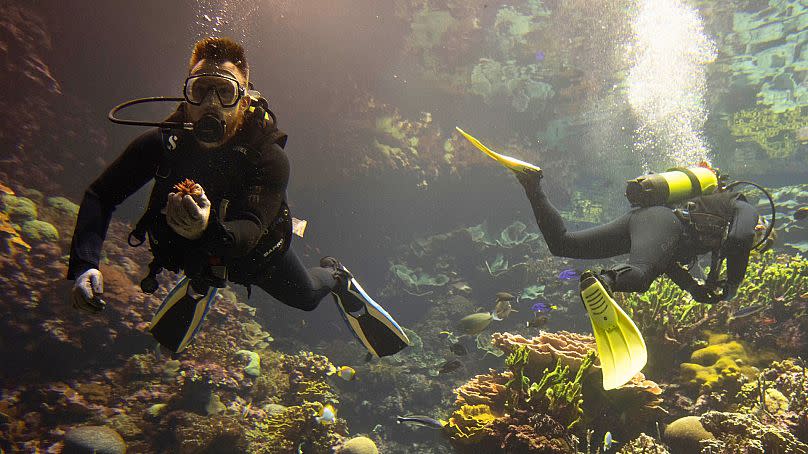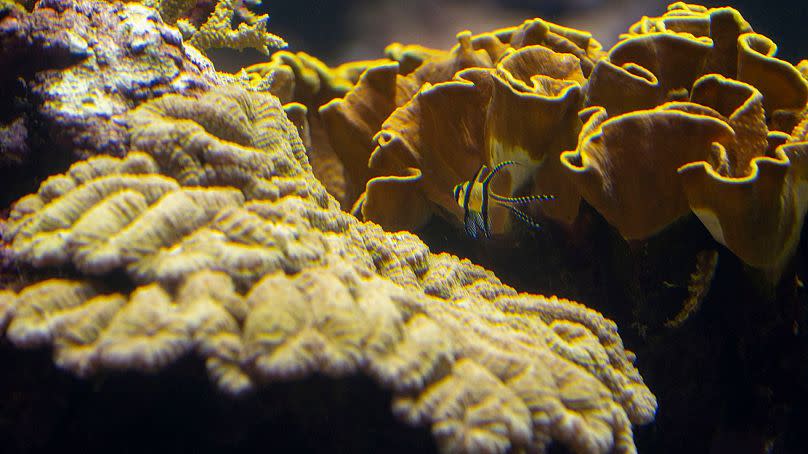Europe’s largest reef has welcomed corals bred in a zoo by the World Coral Conservatory project.
Gloved divers introduced the corals to the reef at the Royal Burgers’ Zoo in Arnhem on Monday, in the hope that they can one day be used to repopulate natural reefs.
“This is the first project where we started to keep these corals with a known origin. As we know exactly where they’re coming from, they have the potential to be placed back into the wild," explainsNienke Klerks, a biologist at the zoo in the Netherlands."So it is very important to keep these corals, as it’s going not very well in the wild."
It’s among several projects worldwide seeking to address the decline of coral reef populations, which are suffering from bleaching caused by rising sea temperatures.
Corals are central to marine ecosystems, and while these projects won’t stem the tide of damage from human-caused climate change, they are seen as part of broader solutions.
The World Coral Conservatory hopes to create a bank of corals in aquariums across Europe that could be used to repopulate wild coral reefs if they succumb to the stress of climate change or pollution.
Coral poaching is a major threat to reefs
Along with two zoos in France and the originator of the project - the Monaco Scientific Center - the zoo in the east of the Netherlands took in more than a dozen coral fragments from off the coast of Seychelles in east Africa.
The Dutch zoo has been propagating the corals since 2022, allowing them to grow in a highly regulated environment before they were large enough to join the rest of the reef.
“We test it behind the scenes… what works for these corals. In that way, we know where to place them and how to keep them,” says zookeeper Pascal Kik.
Portugal’s cork forests are major carbon sinks - but they face threats from climate change
‘Red flag’: Bug splats on cars reveal a staggering drop in insect numbers over last 20 years
Each diver held up a coral to be photographed by reporters before placing them on a ledge near the centre of the eight-million-litre tank.
Few of the other corals at the zoo come from the wild. They are either shared by other zoos or turned over by Dutch customs officers after being confiscated. Coral poaching is a major threat to coral reefs in parts of Asia.
That would make it difficult to return the corals to the wild. But the team knows exactly where their 14 corals came from, making it more likely they could be successfully reintroduced if needed.
Around a quarter of marine animals are dependent on coral reefs
Corals are a keystone marine species, according to Mark Eakin, executive secretary for the International Coral Reef Society. Eakin, retired coral monitoring chief at the US National Oceanic and Atmospheric Administration (NOAA), says that around 25 per cent of marine animals spend some part of their lives dependent on coral reefs.
That makes projects such as the one in Arnhem all the more important to pursue, he says.
“We are in a situation where we really need to be taking any possible action we can,” emphasises Eakin.
Earlier in April, scientists from the NOAA and International Coral Reef Initiative said that coral reefs around the world are experiencing global bleaching for the fourth time.
Bleaching occurs when coral under stress expels the algae that gives them their vibrant colours. The algae is also a coral’s food source, and if the bleaching lasts for too long or is too severe, the coral could die.
In the world’s largest coral reef ecosystem, Australia’s Great Barrier Reef, bleaching affected 90 per cent of the coral assessed in 2022. The Florida Coral Reef, the third-largest, experienced significant bleaching last year.
Terry Hughes of Australia’s James Cook University, an expert on the Great Barrier Reef, argues that the world needs faster, bolder efforts to stop the damage from climate change, instead of small-scale restoration projects like this one.
“You can’t replace a magnificent ecosystem with an aquarium,” he says.
Others argue that every little bit helps.
“Coral reefs would be one of the first systems to totally collapse due to climate change,’’ says Ronald Osinga, a marine biologist who specialises in corals at Wageningen University in the Netherlands.
“It’s sad that it has to be like this,” says Osinga, who is not involved in the Dutch zoo initiative. But projects like this are a “good backup plan”.

